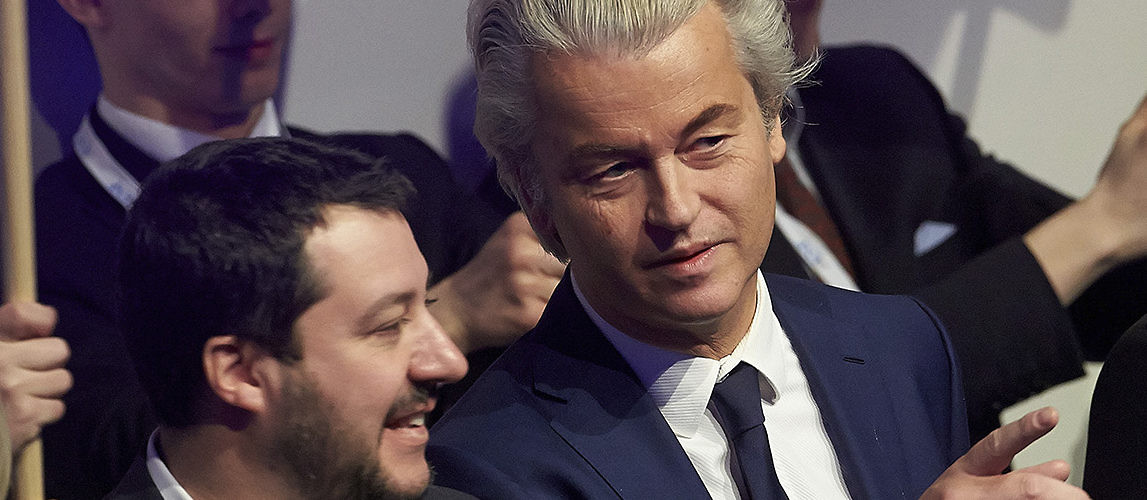Dutch Party for Freedom leader Geert Wilders gestures to Matteo Salvini of Italy's Lega Nord. Koblenz, Germany, January 21, 2017. (Thomas Frey/Associated Press)
On Wednesday, March 15, Dutch voters will head to the polls to elect a new parliament and prime minister. And, for once, the rest of Europe will be very interested, as the question looms of whether the leader of the populist far-right Party for Freedom, Geert Wilders, can become head of the Netherlands’ government.
Although the Freedom Party’s election platform consists of just a single page with 11 bullet points, it has not failed to shock. Wilders promises a Dutch exit from the European Union, the closure of all mosques in the country, a ban on the Koran, and closed borders for refugees and immigrants from Islamic countries. Just a few months ago, Wilders was convicted by a Dutch court for group defamation and incitement of discrimination after he had stirred up an audience to chant support for fewer Moroccans in the country. Yet Wilders has headed the polls for well over a year and is now in a neck-and-neck race with the incumbent, Prime Minister Mark Rutte from the Liberal Conservative Party.
Wilders’ popularity is not new, but it has reached some high peaks recently. Indeed, the court conviction seems to have been “grist to Wilders’ mill.” It has fueled the perception that he is the only politician with the courage to say what is going wrong in the Netherlands. Another important rise in popular support occurred in fall 2015, when the refugee crisis led to heated debates about immigrants taking advantage of the Dutch state and protests about the location of asylum centers. Wilders spoke in Parliament about a “tsunami” of asylum seekers and said that the so-called Islamic State was smuggling thousands of terrorists into Europe.
Broadly speaking, it seems that a large group of Dutch voters feel that their quality of life is threatened by pressures from outside. Such pressures include the presence of Muslims, who are seen as a menace to the culture of gender equality, tolerance, and freedom that is perceived as typically Dutch. Moreover, budget cuts over the course of the European economic crisis are seen to have disproportionately hit “hard-working” Dutch citizen and pensioners and thereby threatened their social security. And, finally, many not only see the EU and Brussels as a threat to national culture and sovereignty but share a widespread perception that the Dutch have paid billions of euros to Eastern and Southern member states in the wake of enlargement and the economic crisis. In this context, Wilders puts the blame on elitist politicians and promises to give “our money” and the Netherlands back to “us.”
So, the question is, can Wilders win?
Current polls indicate the chances of the Party for Freedom becoming the largest entity in Parliament are good. But there are bumps in the road ahead. First, Wilders is a supporter of the presidency of Donald Trump in the United States—the website Politico even claims he “invented Trumpism.” But Dutch media have been overwhelmingly negative about Trump’s personality, behavior, and policies since he took office. Second, Wilders has caused some fuss in the run-up to the first election debates. He tweeted a fake picture in which the leader of the Liberal Democrats appeared to stand among a group of protesters demanding “sharia for the Netherlands.” He also cancelled two out of four initially scheduled debates after a television station adjusted the number of parties invited to participate and published an interview in which Wilders’ own estranged brother severely criticized his ideas. Both Wilders’ support for Trump and his absence from most major debates may diminish potential voters’ sympathy for him, which may lead to a shift away from the Party for Freedom, as witnessed on previous occasions.
Even if the Party for Freedom were to become the biggest group in Parliament, Wilders’ chances of becoming prime minister seem very slim. In the Netherlands, the 150 members of the House of Representatives are elected from party lists through proportional representation. The threshold for a party to enter the House is one seat—0.67% of the votes—meaning that the percentage of votes roughly determines the percentage of seats won by a party. Moreover, political preferences of Dutch voters have become highly fragmented, as elsewhere in Europe. It is likely that almost 15 parties will enter Parliament after the elections and even the biggest will only have around 30 seats. In this scenario Wilders would need to find at least three partners to form a coalition government with a stable majority, but potential partners have already announced that they are unwilling to cooperate. This seems to leave him in an isolated position.
The election debates will take off in the final three weeks before the election. It remains to be seen what the decisive issues will be but likely contenders are healthcare, care for the elderly, pensions, defense, European integration (or disintegration), and immigration and asylum. Whether the bumps in Wilders’ road will turn out to be roadblocks is yet to be determined.
Afke Groen is PhD candidate and teaching assistant at the Faculty of Arts and Social Sciences, Maastricht University and the Amsterdam Institute of German Studies. This article was originally published on Alliance Europa.





